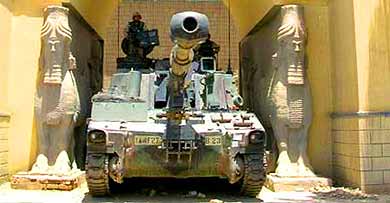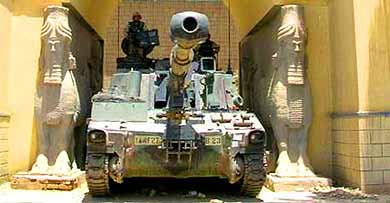
“The real complaining party at the bar in this courtroom is civilization.”
– Judge Dan Haywood, Judgment at Nuremberg
In her current article at Antiwar.com, Lucy Steigerwald reminds us that, while the deaths of tens of millions of innocent men, women, and children provide the strongest indictment of war, there are other costs that need to be accounted for; costs that can only be calculated in terms of the adverse consequences to peaceful, productive, and decent society — i.e., to civilization itself. Among the earliest casualties of the American attack on Iraq were the destruction and looting of archeological sites, museums, libraries, and other cultural locations that help a nation to define itself. The United States did not invent such ruinous forms of barbarism, nor has the practice abated in such cities as Mosul, where ISIS forces have eagerly and intentionally looted the local museum of its important collections. The fourth century burning of the library at Alexandria — then considered to be the greatest collection of the world’s literature – reveals the depths of insanity that inhere in the war system.
Historical records and artifacts, art, literature, music, architecture, and belief systems, help to provide people with a sense of what their culture has been about, what it has produced, and what its people envision as the worthwhile foundations of their society. As modern psychopaths look for any pretext to paint a desired enemy in the colors of savage vulgarity, evidence — and, thus, understanding — of its more cultivated and productive character must be destroyed. Those who insist on other people’s children being sacrificed to a new crusade against Arab nations, for instance, would do well to discover just how much of the substance of Western Civilization — in the sciences, mathematics, medicine, art, and other expressions of the best of what it means to be civilized — is directly traceable to Arab culture.
In a world dominated by the pursuit of material values, we tend to overlook the importance of what is unseen or only glimpsed through hazy lenses that can be found in libraries, museums, art, and other attributes of what it means to be civilized. The poet, William Carlos Williams, reminds us of the costs associated with ignoring the unseen values: “It is difficult to get the news from poems, yet men die miserably every day for lack of what is found there.”
Reprinted with permission from LewRockwell.com.


